Humble Faith
July 7, 2016
Categories: Humility,Love,Religion/Spirituality
It seems paradoxical, but sometimes doing the right thing and following all the rules can actually move you further away from loving God and loving others. One of my favorite stories illustrating this point involves Jesus going to a dinner party at the house of a Pharisee named Simon, who was an excellent rule follower. Here is what happened:
When one of the Pharisees invited Jesus to have dinner with him, he went to that Pharisee’s house and reclined at the table. A woman in that town who lived a sinful life learned that Jesus was eating at the Pharisee’s house, so she came there with an alabaster jar of perfume. As she stood behind him at his feet weeping, she began to wet his feet with her tears. Then she wiped them with her hair, kissed them and poured perfume on them.
When the Pharisee who had invited him saw this, he said to himself, “If this man were a prophet, he would know who is touching him and what kind of woman she is—that she is a sinner.”
Jesus answered him, “Simon, I have something to tell you.”
“Tell me, teacher,” he said.
“Two people owed money to a certain moneylender. One owed him five hundred denarii, and the other fifty. Neither of them had the money to pay him back, so he forgave the debts of both. Now which of them will love him more?” (Note: a denarii was equal to about a day’s wages.)
Simon replied, “I suppose the one who had the bigger debt forgiven.”
“You have judged correctly,” Jesus said.
Then he turned toward the woman and said to Simon, “Do you see this woman? I came into your house. You did not give me any water for my feet, but she wet my feet with her tears and wiped them with her hair. You did not give me a kiss, but this woman, from the time I entered, has not stopped kissing my feet. You did not put oil on my head, but she has poured perfume on my feet. Therefore, I tell you, her many sins have been forgiven—as her great love has shown. But whoever has been forgiven little loves little.”
Then Jesus said to her, “Your sins are forgiven.”
The other guests began to say among themselves, “Who is this who even forgives sins?”
Jesus said to the woman, “Your faith has saved you; go in peace” (Luke 7:36-50).
There’s a strong connection between how much you feel you have been forgiven and how much you love others. The woman in this story was a prostitute—she knew she needed grace and forgiveness. From this place, she showed great love—wetting the feet of Jesus with her tears, kissing his feet, and pouring expensive perfume over his feet.
Simon the Pharisee was in a different place. He thought he was a pretty good guy—he was an esteemed religious leader and he followed all of the rules. He viewed Jesus as a colleague, and didn’t realize his own need. From this place, he didn’t show much love at all. Simon didn’t show Jesus hospitality—no water, no kiss, and no oil. And he didn’t have any love for the woman in this story—instead he judged her harshly, wanting her to go away.
If you identify with the sinful woman in this story, you probably recognize your own need for grace and forgiveness. From this place, Jesus welcomes you to him, forgives your sins, and calls you to go in peace, free to love others as you have been loved. But if you identify with Simon the Pharisee, the road to true connection with Jesus can be more difficult. Pride can get in the way of us understanding our own need for grace and forgiveness.
This is where humility comes in. I need to recognize my privilege. When I do that, I realize that most of the times in my life when I have made a good decision or avoided a mistake, it wasn’t due to something special about me. I don’t have some unique moral fortitude. It’s because of my privilege. If I were in a different situation—for example, if I didn’t have two parents who loved me, if I didn’t have enough money, if I started to run with the wrong crowd—I could be in the same exact same situation as the people I judge. Simon the Pharisee has the exact same potential in his heart as the sinful woman he judges so harshly. Until he recognizes that—until I recognize that—I will continue to love only a little.
Discussion: Who do you identify with in this story? What do you think about the connection between receiving grace and forgiveness, and loving others?
Related Thoughts

Subscribe To My Newsletter
Join my mailing list to receive the latest blog posts.
Receive my e-book “The Mental Health Toolkit” for free when you subscribe.





